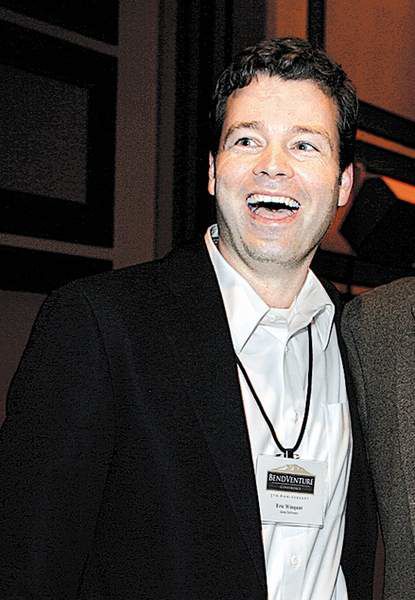Portland startup is ‘stoked’ at $110K vote of confidence
Published 5:00 am Saturday, October 18, 2008

- Eric Winquist, former co-founder and president of Jama Software, celebrates after his company won Bend Venture Conference’s $110,000 investment prize in 2008.
Jama Software, a Portland startup company, won the investment prize at the fifth annual Bend Venture Conference on Friday.
The company stands to receive $110,000 from the conference’s investment fund, which was established by 21 local investors contributing at least $5,000 each.
The award is not handed out immediately but is instead subject to due-diligence review of the company by the fund’s investors, said Bruce Juhola, a BVC board member who oversees the investment fund.
“We’re stoked,” said the company’s co-founder and president, Eric Winquist, adding that the investment would help the company kick-start additional fundraising.
Jama makes a Web-based product management software application that can help companies track product development and design.
Winquist, who has made investment pitches before but never in a contest format, said he enjoyed the conference and found it “laid back” and educational.
“I really appreciated it,” said Winquist, who added he doesn’t have any plans to move the company to Bend.
Juhola said 26 companies applied for this year’s event, the same as last year.
“This was a very tough decision,” Juhola said. “The quality of the companies that applied was great, as were the presentations. … Every year gets better, which leads to lots of great young companies thinking about the Bend Venture Conference.”
Executives with Bend-based Eco-Winter Systems, one of the conference’s four finalists announced before the competition, remained optimistic after finishing out of the money.
“It was a privilege and honor to be here, and we’re going to keep looking for funds,” said co-founder Tom Barquinero.
Barquinero, a former advertising executive, was criticized by the investor panel for being too confident in his 10-minute presentation.
Eco-Winter has designed a home-winterization system that pumps a sugar-based, nontoxic antifreeze product into a home’s water pipes, which enables the homeowner to turn off the home’s furnace. Barquinero sees big potential for the system among owners of second homes in cold climates who could save money by not heating empty houses.
The other finalists were Dune Science of Eugene; Golden Signals of Beaverton; and GadgetTrak of Tualatin.
Inside the conference
GadgetTrak, originally selected as one of the conference’s 10 wild-card selections, was named a finalist at the conference after being voted into the final round by the audience after hearing all 10 wild cards give one-minute pitches about their companies.
GadgetTrak makes a software product that gives customers who have had their laptops or other mobile devices stolen the ability to track their location using wireless networks. The software also allows users to remotely destroy any data on the stolen devices.
The finalists each had 10 minutes to make their pitches and then answered questions from an investor panel made up of five regional venture capitalists.
The investor panel did not vote in any of the conference’s events. In addition to asking questions to the pitching companies immediately after their presentations, the panel later spent an hour in the afternoon discussing the company pitches in detail for the benefit of the audience. The conference attracted roughly 250 people to the Tower Theatre in downtown Bend.
Karen Fast, a co-founder of the BVC, said the afternoon session with the investor panel is one of the conference highlights.
Larry Wood, a software designer who recently moved to Bend from Seattle and who was in attendance, said he was surprised at the event’s turnout and quality of speakers. Wood said he had attempted a few years ago to fund his own startup with venture capital money but was unsuccessful.
After Friday’s event, Wood said he would try again.
“It gives me hope,” said Wood, whose company is High Wire Software. “We’re looking at taking a fresh start and being in Bend is really invigorating.”
The BVC was founded with the goal to promote Bend and Central Oregon as a great place for entrepreneurs as well as provide investment opportunities for its participants. Local companies are not given any weight in its proceedings.
This was the third year prize money was awarded. Bend-based PleuraFlow, now known as Clear Catheter Systems, won the first prize in 2006. The 2007 winner was Portland-based Elemental Technologies.
The keynote
The all-day conference also featured an hourlong keynote address by Rich Karlgaard, publisher of Forbes, who serves on the magazine’s editorial board.
Karlgaard said the country’s current economic woes, while serious, also present incredible opportunities for entrepreneurs.
Karlgaard drew as a comparison the years 1973-75, when the economy dipped after an energy crisis and political turmoil. Still, the period spawned numerous enterprises that are household names today, such as Microsoft, Apple, Oracle, Genentech, Southwest Airlines and FedEx.
“On the surface, those years were lousy, so it drove clever people underground,” Karlgaard said. “In 2003, smart people went to work on Wall Street or at a hedge fund, so the silver lining to the current climate is more people will go into entrepreneurship.”
Karlgaard said the country is not anywhere near another Great Depression and that consumer confidence has been weakened by a number of undue influences, such as a collective lack of business literacy in the press and the public, and election year politics that always feature the out-of-power party portraying the economy in a poor light for political gain.
He said the economy is in recession, that the year’s final quarter will be bleak due to negative gross domestic product growth, that the economy will be flat in the first half of next year and that the economy’s next worry is likely to be inflation.
Still, Karlgaard was optimistic. He said the government was stumbling on decisions but not making bad decisions.
“This is not a collapsing economy but a network outage, the outage being the stopped flow of credit,” Karlgaard said.






